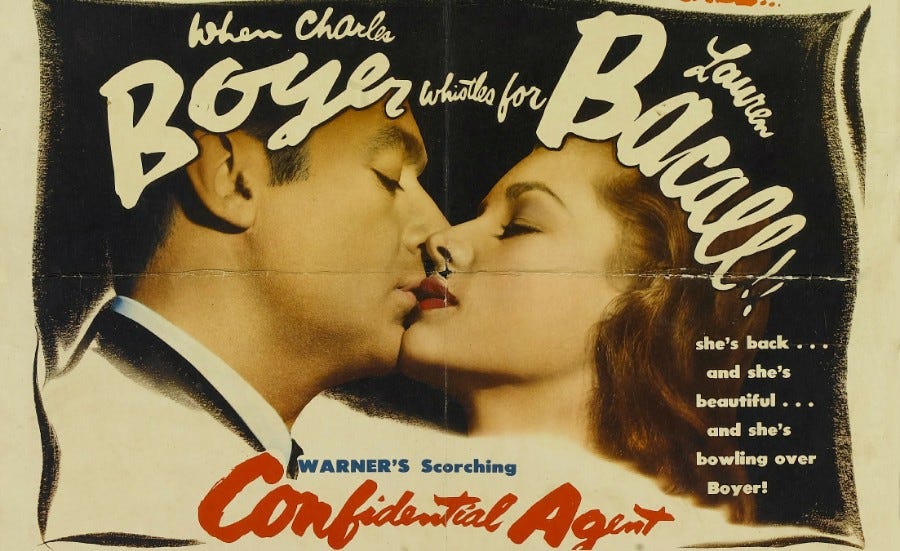Stream On: Going Greene with ‘Confidential Agent’
Graham Greene only wrote the book for money, but this film adaptation was one of the few of his novels that he enjoyed.
Graham Greene (Stream On) tried to divide his novels into “serious” literature and “entertainments,” but his native talent produced works that were always taken seriously. Greene wrote The Confidential Agent for money in six weeks in 1938, holed up in a rented room and taking Benzedrine (an amphetamine) to keep going. When he sobered up he wasn’t pleased with the book and wanted it published under a pseudonym, but critics and the public loved it.
Meanwhile, model Lauren Bacall (Key Largo) had been a hit in her first film, Howard Hawk’s To Have and Have Not (1944) and Warner Brothers featured her prominently in the campaign for their adaptation of Greene’s very popular novel.
/Amazon /Streaming /🍿73% /Trailer /1945 /NR
In the midst of the Spanish Civil War (unnamed in the novel), Luis Denard (Charles Boyer), a former concert pianist and composer, travels to England as a confidential agent of the Republican government. His mission is to buy coal or to deny it to the Fascist rebels. On the ship, he meets bored rich girl Rose Cullen (Bacall), whose father, Lord Benditch (Holmes Herbert), heads the firm with which Denard will negotiate.
In Greene’s literary autobiography Ways of Escape, he wrote that he had “a certain vague ambition to create something legendary out of a contemporary thriller: the hunted man who becomes in turn the hunter, the peaceful man who turns at bay, the man who has learned to love justice by suffering injustice. But what the legend was to be about in modern terms I had no idea.”
On the road to London, Denard is beaten and robbed by Fascist agents, who do not find the documents in his shoe. In England it is as if no-one knows there is a war on in Spain and public life flows serenely on. At his hotel Denard asks the young maid, Else (Wanda Hendrix), to hide them in her stocking. When he meets his contacts, Contreras (Peter Lorre, The Maltese Falcon, The Mask of Dimitrios) and Maria Melandez (Katina Paxinou), he finds they have sold out to the Fascists and want him discredited or killed. And they have killed the maid.
Denard is no James Bond, or even an Alec Leamas (The Spy Who Came in from the Cold): he is a composer (in the novel, a university intellectual), answering the call of his country. His wife had been executed by mistake (he says that he is a man in love with a dead woman) and that inspired him to offer his services to his government; personally he is depressed and reticent—and surprised at his feelings for Rose, who comes to help him.
Confidential Agent fared poorly with the critics; it had been thought that the thriller aspects of the story would engage general audiences, while the subtler treatment of moral intransigence would have flattered the critical minority, but apparently it was not sophisticated enough for the snooty-pants critics. In 1979 Greene wrote, “Mr Philip Purser writes that Lauren Bacall was ‘insanely miscast in her third picture The [sic] Confidential Agent and having given—as she admits—a lousy performance, she nevertheless bitterly resented the cool notices that came her way.’ I also as the author of the book resent those cool notices. This remains the only good film ever made from one of my books by an American director and Miss Bacall gave an admirable performance and so did Charles Boyer.”
Still, Lauren Bacall herself thought that the film damaged her reputation, and director Shumlin was stung enough that he never made another film. (His successes came on the stage, to which he returned.)
Apart from not seeing suave Charles Boyer as “D,” (as Denard is called in the novel), “a middle-aged man with a heavy moustache and a scarred chin and worry like a habit on his forehead,” I’m with Greene.
Pete Hummers is a participant in the Amazon Services LLC Associates Program, an affiliate advertising program designed to earn fees by linking Amazon.com and affiliate sites. This adds nothing to Amazon's prices. This column originally appeared on The Outer Banks Voice.


